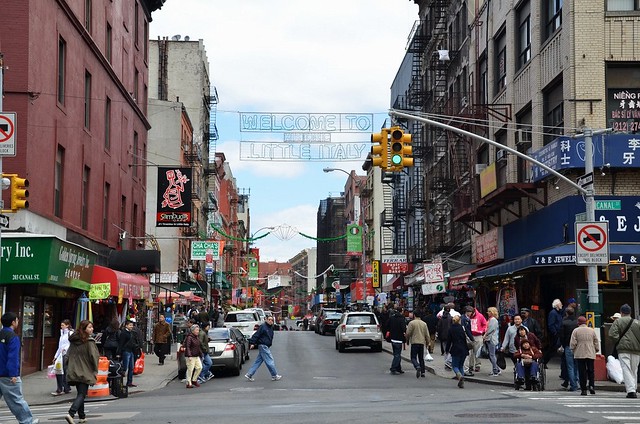
Yes, I know, it says 'Welcome To Little Italy' but this was in Chinatown, or at the border between Chinatown and Little Italy.

More chaotic than the streets of Hong Kong.
One morning, we had dim sum in Chinatown. It was our second visit to Chinatown, the first one on the night we arrived. My daughter said I'm the typical Chinese who has to check out Chinatowns wherever I go. She's right but I bet when she's older, she'll do the same.
NYC's Chinatown at night is indistinguishable from many Asian cities. It looks and smells like any Chinese cities, except it is dirtier than most. The last time I was there, 24 years ago, it was dirty too. Maybe they think that Chinatown is more charming and authentic if it's dirty but it's time they visit China because most cities there are now cleaner than NY Chinatown.
Ah, but the food. I shouldn't make a comparison after eating just two meals in NY Chinatown and about 6 in San Francisco Chinatown but I found the Chinese food in SF oily, especially for Cantonese food. Although Chinese food in America is authentic, it somehow tastes different. Maybe it's because the ingredients are cut bigger (everything's bigger in America) or the ingredients, being grown/reared in America, taste different. I love the tenderness and freshness of their veggies but--this may bring many howls--they lack flavor. You won't taste the difference if you aren't discerning about your veggies, especially those that are lightly flavored. Western salads are mostly lettuce, unless you throw in the chicory and the rocket (or arugula, if you are American), so flavor of veggies isn't a big factor to consider, when eating western. The difference is more obvious in veggies that have a stronger flavor. Think watercress, cilantro and tung ho, 'chrysanthemum leaves', veggies that have a stronger flavor than most. These veggies are nearly tasteless in temperate countries (except China, and I'll tell you why later). I think that the reason maybe because the growing season is short (veggies sprout by the inch overnight in temperate countries) and also that large-scale farming is efficient in producing lots of quality produce that don't taste the same as veggies grown on small scale organic farms. In KK, I grow my own or source organic veggies and they are sweet and flavorful but because they are harvested older, they taste more fibrous. In China, veggies are perfectly tender and flavorful because they have a temperate climate and veggies are fertilized with organic chemicals. But as always with win-wins, there's a catch. If you want to know what organic chemicals really means in China, find out in my travel posts on China.
I noticed the same thing in dim sum. I love dim sum and I think dim sum in western countries are such an eye treat because the portions are so big and generous. However, I find that the meat in dim sum is so tenderized and swollen that they taste bland. Those under 25 years will not notice the difference. My daughter and youngest son don't like prawns but they love the prawns in Australia because they are "bouncy and flavorless". Hello. You might as well eat imitation prawns, I tell them. Bouncy and flavorless prawns are so because they have been treated with tenderizers. Western cuisines have revolutionalized (except for fast food chains) and turned/are turning to fresh, organic, flavorful produce but Chinese restaurants still use a lot of food enhancers and improvers.
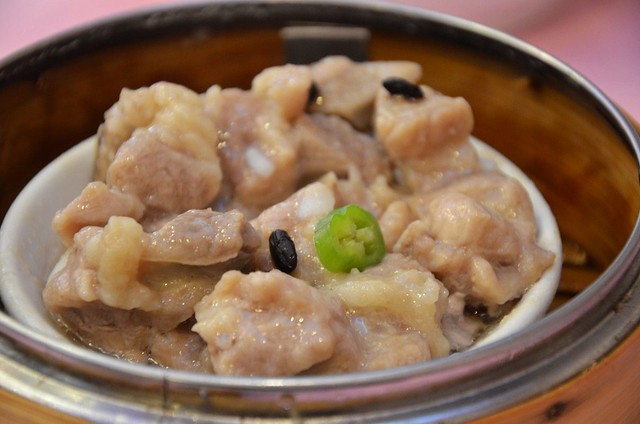
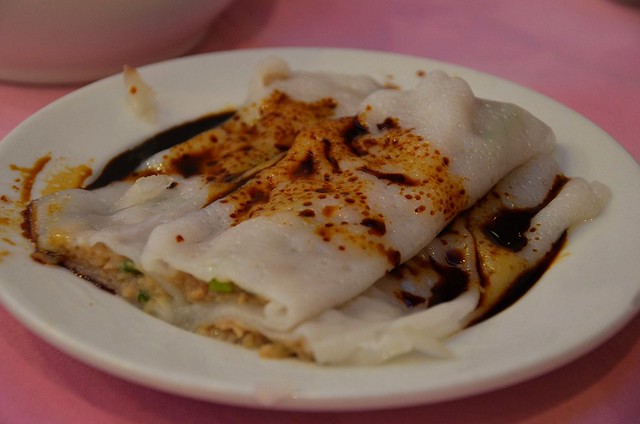
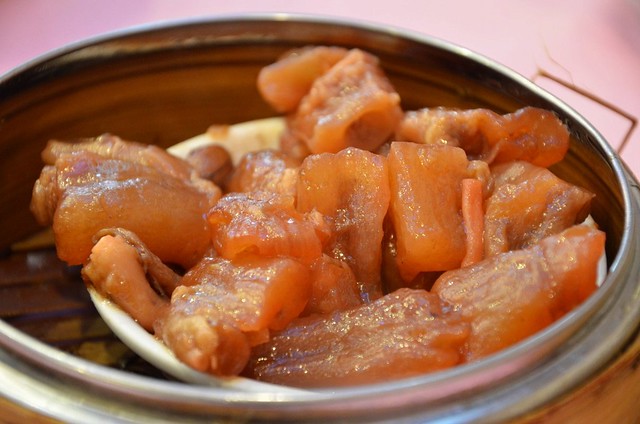

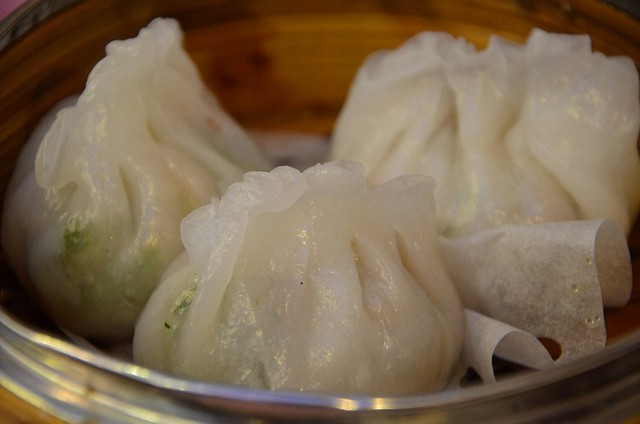

My fave dim sum is ha gow, shrimp dumplings. Although the ha gow filling in SF and NY are very authentic, with tiny strips of canned bamboo mixed with the shrimps to give that particular flavor which we can't find in Malaysian ha gow, the ha gow in SF and NY have a chewy skin which is definitely not the way it should be. Ha gow skin should look translucent and taste soft but not mushy, and definitely not chewy.
All that dim sum and a pot of tea for about USD13 before service charge.
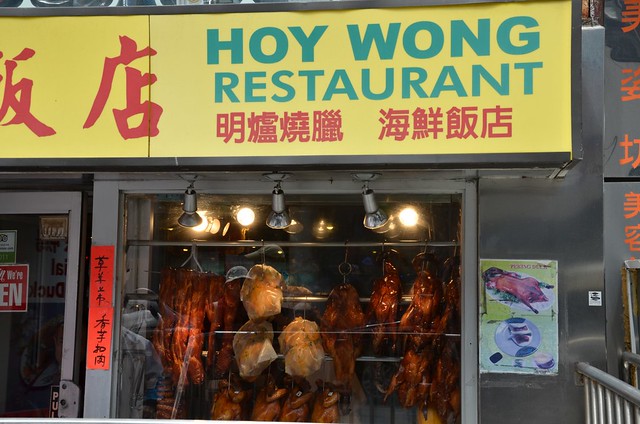

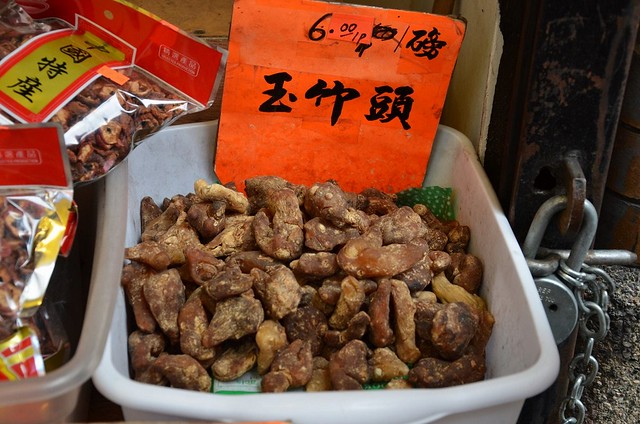
Chinese herbs are so fresh that I couldn't tell that this was 'yuk juk' (?) because what we get back home is shaved into thin slices and dried. Chinese herbs are fresher in NYC's Chinatown than in HK, it seems.
Let's say you go shopping. You have USD20 in your wallet.

You buy a bittergourd forUSD1.00. You still have USD19.00.

You buy two bunches of asparagus for USD2 (USD1 each!). You have USD17.00 left. (The asparagus were very sweet and tender, btw.)

You throw in a large punnet of strawberries and are left with USD16.00. The strawberries are very big, you eat them like you eat a prune, and they are very sweet so you dispel your habit of only eating strawberries with cream.
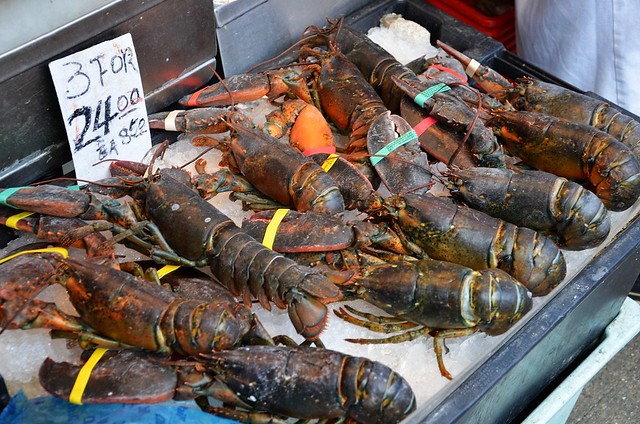
You get a lobster for USD8.50 and are left with USD7.50.
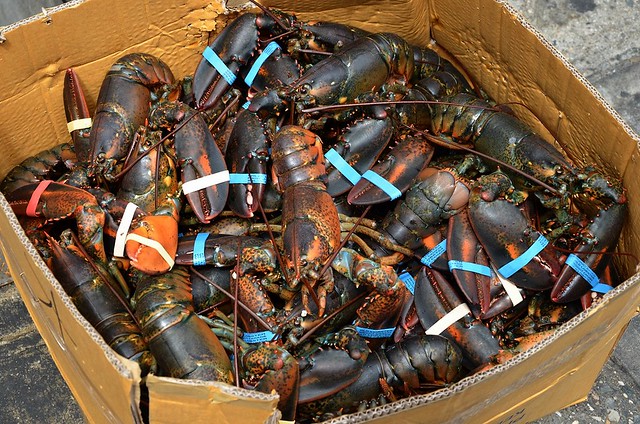

Your balance is enough to buy you a pound of crab, and you still have 10 cents left. Dinner is a feast. You have lobster with ginger and scallions, steamed crabs, stir-fried asparagus and bittergourd salad. Dessert is strawberries of course.
You can't even buy one papaya or any seasonal tropical fruit for RM1.00 in KK. What will RM20 get you here?
It annoys me when people insist that the costs of living in Malaysia is lower than in the US when it is a fact that Malaysia is only cheap if you convert the prices into USD. For the average person living anywhere, the actual currency and what you get for it shows the power of that currency. I'll say safely that you can feed a family of 5 easily for a week in the States, on an average diet of local produce, for USD100. RM100 for a family of 5 will mean eggs and instant noodles most of the time. What about houses? A friend bought a small detached house, for USD800,000 in SF but in KK, RM800,000 will get you a corner double storey house. I've forgotten all my finance and economics, but given that the average income here is so much lower than in the States, shouldn't everything be less expensive here? Even of you factor in the lower tax we pay, our cost of living and buying power are pathetic and just getting from bad to worse.
The other thing that annoys me is how Sabahans are so adamant that there's plenty of seafood in Sabah. There's plenty in the sea but the seafood that's caught has gone out of the state because we can't afford to pay the prices other countries can. I wanted to make clam chowder and the only place that had clams were the restaurants. I couldn't get the small manila clams and had to settle for big clams, 7 of which cost me RM17. We were at a seafood restaurant last week and they only had small crabs which cost RM22 per kg. Other than crabs and a couple of spiny tropical lobsters (all head and small body with no claws), a couple of fish and prawns, there was nothing else. In the States, there're so many varieties of seafood that going shopping is like a study tour for me.
Sabahans still think that there are lots of timber in Sabah too. Wake up and smell the carbon dioxide. If we are always in denial, we'll never change for the better. If things are so right, why are Sabahans, especially the young, working in KL, Singapore and Australia?

9 comments:
"NYC's Chinatown at night is indistinguishable from many Asian cities. It looks and smells like any Chinese cities... Maybe they think that Chinatown is more charming and authentic if it's dirty but it's time they visit China because most cities there are now cleaner than NY Chinatown."
Interesting thought Terri! I often wonder that too however most/all of the Chinatowns around the world that I have seen were like one huge "wet market" or indoor tai pi dung. They are not your conventional "towns/cities" while cities in China are in a constant modernization as well.
new york is quite dirty, IMO.
almost like kl T_T
I didn't realize produce is this cheap in the US. And this is NYC where cost of living is supposedly higher than the other States. The same items are at least 2-3 times the price here in the UK.
I agree about the high cost of living in Malaysia. I was stunned when I went back 2 years ago.
that is cheap !! and a box strawberry for only USD1.
glad to see you like NYC's CT. when i lived in the city i was a 10 minute walk away. i went there for lunch and shopping for the house whenever i could. i especially like the prok and seafood that is available in the fresh markets as well.
the produce on the streets will change with the seasons, as it should, but there is always something good and cheap too.
i so agree with you about the difference of cost of livings, the buying power references in terms of feeding a family with $100 and RM100. i for years always try to tell people back in kk they are being swindled by their own beliefs for thinking their costs living is acceptable. but they never know till they set foot in americA.
yes, every time I travel overseas, I feel I have been shortchanged by our government. How can our cost of living be so high as compared to those in US or UK. Sigh.. hate to think that all these might be a contribution to someone's mega big diamond ring!!
Anyway, I enjoyed all your posting on your holiday. It's simply lovely!!
Goodness, I didn't expect a visit to NYC Chinatown to turn into a rant about Sabah. But it is what it is, and you are spot-on with your observations.
The cost of food is quite low in the US, probably due to the economies of scale. But housing isn't cheap, nor taxes.
Buying power is definitely better in the US, as are salaries. But there is pollution, there is crime, there is overcrowding.
There is no perfect place to live. If there were, everybody would try to live there, and then the place would be screwed.
nate: ah, wait for my conclusion on where's the best place to live. at least for the next 10 years.
Post a Comment